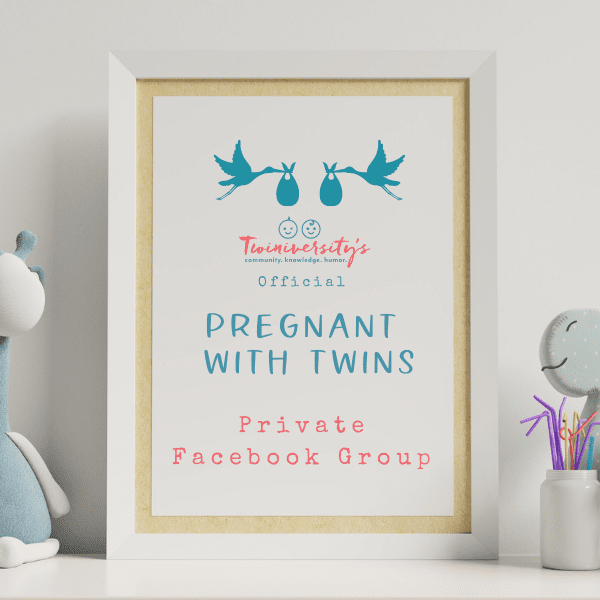Last updated on September 29th, 2023 at 10:36 pm
Aside from that first cry, there is no sweeter sound than when you hear your twins’ heartbeats for the first time. Whether you found out it was twins right away, or an ultrasound showed you later in your pregnancy, you’ll be eager to hear those two heartbeats thump-thumping together. You might be wondering when and how this happens, and if having twins will change your experience. We’ve got you covered with all you need to know about this important milestone of twin pregnancy.
Did you know we have a FREE Facebook group just for expecting twin parents? Hurry and join today to find support from expecting twin mamas who get it!
How Early Can Twins’ Heartbeats Be Detected?
A baby’s cardiac muscles begin to develop between weeks 3 and 5 of pregnancy. As the heart chamber develops, a flickering beat can be seen by transvaginal ultrasound as early as 3 to 4 weeks gestation, and a regular ultrasound between weeks 6 and 8. Finally, around week 10 the babies’ heartbeats are usually strong enough to hear with a fetal Doppler or ultrasound. Around week 20, the heartbeats can be heard through a stethoscope.
That said, sometimes you have to wait a bit longer to hear one or both of your twins’ heartbeats. For example, a tilted uterus, an anterior (front-facing) placenta, or extra weight around your abdomen can make it harder to hear the heartbeat early on as there are barriers between the Doppler and the womb. Sometimes, the babies play hide and seek or their positioning is too far from the Doppler. Don’t freak out if you don’t hear that sweet sound at 10 weeks. As your babies grow, you will eventually get a listen, likely around 12 weeks of pregnancy.
What Is a Fetal Doppler?
A fetal Doppler is a monitoring tool used by your doctor or midwife as part of your routine prenatal care. This device works like an ultrasound as it uses sound waves to detect a baby’s heartbeat. However, it only transmits sound. Beginning with your 10 to 12 week prenatal appointment, your care provider will perform a fetal Doppler test with each check-up. This is to ensure the babies’ heart rates are strong and normal. An identical twin pregnancy may have more frequent ultrasounds. However, it is common in diamniotic (fraternal) pregnancy to rely on the fetal Doppler test during the first and second trimesters. A fetal Doppler test is completely safe and painless with the ultimate reward of hearing the pitter-patter of your womb.

To perform a fetal Doppler test, the pregnant person lies down and the physician applies gel to a probe. This gel acts as a conductor for the sound waves. They then guide it along the abdomen until they encounter fetal heart sounds. Once a fetal heartbeat is located, you can hear the sound through a speaker on the main unit of the fetal Doppler. While listening for healthy heart sounds, your doctor will also count each baby’s beats per minute (BPM) as an indication of their health and development.
Pregnant with twins and not sure where to start? Visit the Ultimate Twin Pregnancy Guide to find all the top articles and resources to get you ready for twins. While you’re at it, check out our expecting twin classes and Twiniversity shop!
What Does a Fetal Heartbeat Sound Like?
During a fetal Doppler test or ultrasound, you will hear a few different sounds coming from your bump. In general, you’ll hear a repetitive “whooshing” noise, which is the fetal blood flow through the umbilical cord. Some pregnant people refer to it as a wave sound. You’ll know when the Doppler is directly over a baby’s heart as you’ll hear a very quick clippity-clop rhythm. Many expectant parents have described it as a thundering train or a horse galloping. Most parents agree it’s a magical experience that makes it all feel real.

What Is a Healthy Heart Rate for Twins?
Early in your pregnancy, the babies’ heartbeats will start slow, averaging about 110 BPM. By week 9, this rate increases to 150 to 170 BPM, or about twice as fast as yours. Fetal heart rate peaks at 9 weeks and will gradually decrease over your pregnancy, averaging 110 to 160 BPM. Keep in mind that fetal heart rate can vary by 5 to 25 BPM and a number of things can impact their heart rate at any given time. This includes maternal causes such as stress, food, and caffeine intake as well as thyroid problems. The babies’ movements and positioning can also influence their heart rates.
A healthy heart rate is a good indicator of a healthy pregnancy, with some research suggesting that an abnormal heart rate can indicate a potentially poor prognosis. One study found that for identical twins, a difference of 20 BPM or more between the babies may be a marker for developing Twin-to-Twin Transfusion Syndrome later in pregnancy. Try not to stress, though. Your doctor knows what to look for and will help you understand any potential complications.

Can I Buy a Fetal Doppler to Hear My Twins’ Heartbeats at Home?
The use of at-home fetal Dopplers has skyrocketed in the last few years. These hand-held devices work like the one in your doctor’s office, using ultrasound waves to detect the babies’ heartbeats. Many parents-to-be claim these devices reduce fear and are a fun way to connect with their babies in between appointments. However, experts including the Food and Drug Administration (FDA), caution against their use for a few reasons.
While research shows they are unlikely to cause harm (unless used excessively), an at-home Doppler does not have much medical benefit either. Rather, they are often the source of more anxiety when used improperly or too early to detect a heartbeat. At-home Doppler devices don’t work as well as the ones in a doctor’s office, making it difficult to find the heartbeat. This can lead to unnecessary worry. You may have more luck in your third trimester, but by then your belly will feel like a soccer tournament so there’s no need to listen, just monitor their movement.
Also, unless you’re an OB you might not know how to interpret what you’re hearing. Often, the doppler picks up your heartbeat instead which can lead to a false sense of security and missed warning signs of complications. That said, living in constant fear over the fate of your unborn babies isn’t healthy either. If you find yourself unable to sleep or worried sick in between appointments, talk to your doctor. They may offer a recommendation for an at-home Doppler or another solution.

Can My Twins’ Heartbeats Predict Their Sexes?
Have you heard the old wive’s tale that a faster heart rate means a girl while a slower rate means a boy? Wouldn’t that be awesome? Especially for Di-Di (fraternal twin) parents who are eager to find out if it’s two of the same sex or one of each. Well, we hate to burst your bubble, but research shows that there is no evidence to support this myth.
A few studies have attempted to find a link between heart rate and sex but have yet to find a correlation. Unfortunately, this myth persists, along with many others that claim to predict the sex of an unborn baby. Other than the sound of healthy hearts, don’t expect to garner any more information about your twins from their heartbeats.

Get Ready to Hear Those Sweet Heartbeats
Twin pregnancy comes with many mixed emotions, often including worry and excitement. You can look forward to hearing your babies’ heartbeats with a Doppler during your (many) check-ups. This not only offers valuable reassurance but it can help you bond with your babies. You might consider recording it with your phone to share with family or your partner, but be sure to get your doctor’s permission first. Now that you know what to expect, get ready for the sweetest sounds you’ll ever hear!












